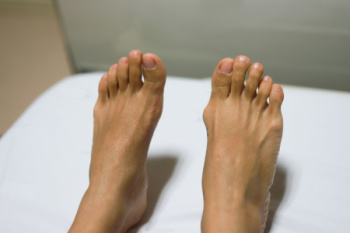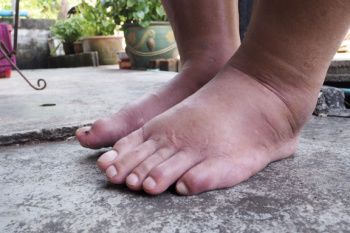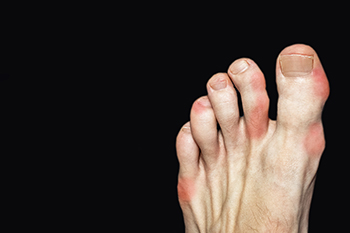Blog
Items filtered by date: September 2024
Symptoms Associated With a Bunion

A bunion is a bony protrusion that forms at the base of the big toe, causing the toe to angle inward toward the second toe. This condition often results in discomfort and can lead to changes in foot structure. Symptoms include pain, swelling, and redness at the site of the bunion, along with the formation of a hard, prominent bump. Movement of the big toe can become restricted, leading to difficulty finding comfortable footwear. Risk factors for developing bunions include genetic predisposition, wearing tight or ill-fitting shoes, and conditions that affect foot mechanics like arthritis. If you have symptoms of a bunion, it is suggested that you schedule an appointment with a podiatrist who can offer you effective relief and treatment methods.
If you are suffering from bunion pain, contact one of our doctors of Favor Foot Ankle Leg & Wound Center. Our doctors can provide the care you need to keep you pain-free and on your feet.
What Is a Bunion?
Bunions are painful bony bumps that usually develop on the inside of the foot at the joint of the big toe. As the deformity increases over time, it may become painful to walk and wear shoes. Women are more likely to exacerbate existing bunions since they often wear tight, narrow shoes that shift their toes together. Bunion pain can be relieved by wearing wider shoes with enough room for the toes.
Causes
- Genetics – some people inherit feet that are more prone to bunion development
- Inflammatory Conditions - rheumatoid arthritis and polio may cause bunion development
Symptoms
- Redness and inflammation
- Pain and tenderness
- Callus or corns on the bump
- Restricted motion in the big toe
In order to diagnose your bunion, your podiatrist may ask about your medical history, symptoms, and general health. Your doctor might also order an x-ray to take a closer look at your feet. Nonsurgical treatment options include orthotics, padding, icing, changes in footwear, and medication. If nonsurgical treatments don’t alleviate your bunion pain, surgery may be necessary.
If you have any questions, please feel free to contact our office located in South Amboy, NJ . We offer the newest diagnostic and treatment technologies for all your foot care needs.
Common Causes of Foot and Ankle Swelling

Foot and ankle swelling can result from various underlying conditions and injuries. Traumatic injuries, such as sprains, fractures, or bruising, often lead to localized swelling due to inflammation and fluid accumulation. Gout, a type of arthritis caused by the buildup of uric acid crystals in the joints, can cause sudden and severe swelling, typically accompanied by intense pain. Arthritis, including osteoarthritis and rheumatoid arthritis, can lead to chronic swelling and stiffness in the feet and ankles as the joint tissues become inflamed. Infections, whether from cuts, bites, or systemic illnesses, can also cause swelling as the body responds to the invading pathogens. If you notice your feet and ankles have become swollen, it is suggested that you consult a podiatrist who can determine the cause and guide you toward effective relief and treatment solutions.
Swollen feet can be a sign of an underlying condition. If you have any concerns, contact one of our doctors of Favor Foot Ankle Leg & Wound Center. Our doctors can provide the care you need to keep you pain-free and on your feet.
Swollen feet are a common ailment among pregnant women and people who stand or sit for extended periods. Aging may increase the possibility of swollen feet and patients who are obese often notice when their feet are swelling too. There may be medical reasons why swollen feet occur:
- Phlebitis - A condition that causes the veins to become inflamed and can also cause leg pain.
- Liver disease - This may lead to low blood levels of albumin which is a protein. This can cause fluid in the blood to pass into the tissues and several areas of the body can become swollen.
- Heart failure - When the heart doesn’t pump properly the blood that is normally pumped back to the heart can pool in the veins of the legs causing swollen feet.
- Kidney disease - One of the main functions of the kidneys is releasing excess fluid in the body. This type of condition can make it difficult for the kidneys to function properly, and as a result the feet may become swollen.
- Deep-vein thrombosis (DVT)- This is a serious condition where blood clots form in the veins of the legs. They can block the return of blood from the legs to the heart which may cause the feet to swell. It is important to be treated by a podiatrist if this condition is present.
Swollen feet can also be caused by bone and tendon conditions, including fractures, arthritis, and tendinitis. Additionally, there may be skin and toenail conditions and an infection may cause the feet to swell. Patients who take medicine to treat high blood pressure may be prone to getting swollen feet.
Many patients elevate their feet to help relieve the swelling and this is generally a temporary remedy. When a podiatrist is consulted the reason behind the swelling can be uncovered and subsequently treated.
If you have any questions please feel free to contact our office located in South Amboy, NJ . We offer the newest diagnostic tools and technology to treat your foot and ankle needs.
What Is Achilles Tendinopathy?

Achilles tendinopathy causes pain and swelling in the Achilles tendon, which connects the calf muscles to the heel bone. It typically arises from repetitive stress or overuse and is often seen in athletes and active individuals. Symptoms include a dull, aching pain along the tendon, which may worsen with activity and improve with rest. Treatment for Achilles tendinopathy usually begins with rest which can help reduce inflammation and discomfort. Stretching and strengthening exercises, particularly those focusing on the calf muscles and Achilles tendon, are important for recovery. Additionally, modifying activity levels and wearing supportive footwear or orthotic inserts can prevent further strain on the tendon. For a thorough diagnosis of Achilles tendinopathy and a personalized treatment plan, it’s suggested you make an appointment with a podiatrist.
Achilles tendon injuries need immediate attention to avoid future complications. If you have any concerns, contact one of our doctors of Favor Foot Ankle Leg & Wound Center. Our doctors can provide the care you need to keep you pain-free and on your feet.
What Is the Achilles Tendon?
The Achilles tendon is a tendon that connects the lower leg muscles and calf to the heel of the foot. It is the strongest tendon in the human body and is essential for making movement possible. Because this tendon is such an integral part of the body, any injuries to it can create immense difficulties and should immediately be presented to a doctor.
What Are the Symptoms of an Achilles Tendon Injury?
There are various types of injuries that can affect the Achilles tendon. The two most common injuries are Achilles tendinitis and ruptures of the tendon.
Achilles Tendinitis Symptoms
- Inflammation
- Dull to severe pain
- Increased blood flow to the tendon
- Thickening of the tendon
Rupture Symptoms
- Extreme pain and swelling in the foot
- Total immobility
Treatment and Prevention
Achilles tendon injuries are diagnosed by a thorough physical evaluation, which can include an MRI. Treatment involves rest, physical therapy, and in some cases, surgery. However, various preventative measures can be taken to avoid these injuries, such as:
- Thorough stretching of the tendon before and after exercise
- Strengthening exercises like calf raises, squats, leg curls, leg extensions, leg raises, lunges, and leg presses
If you have any questions please feel free to contact our office located in South Amboy, NJ . We offer the newest diagnostic tools and technology to treat your foot and ankle needs.
Heel Pain Can Be Treated!
Gout and Dietary Considerations

Gout is a form of arthritis caused by the accumulation of uric acid crystals in the joints, leading to sudden and severe pain, swelling, and redness. This condition typically affects the big toe but can impact other joints as well. Over time, frequent gout attacks can damage joints and affect overall quality of life. Certain foods can worsen gout symptoms, particularly those high in purines, which increase uric acid levels. If you have gout it is advisable to avoid consuming red meats, organ meats, and seafood such as shrimp and anchovies. Additionally, alcohol, especially beer, and sugary beverages can also contribute to higher uric acid levels. Gout can cause extreme pain and discomfort. If you have had one or more gout attacks, it is strongly suggested that you are under the care of a podiatrist who can help you manage this condition.
Gout is a painful condition that can be treated. If you are seeking treatment, contact one of our doctors from Favor Foot Ankle Leg & Wound Center. Our doctors will treat your foot and ankle needs.
What Is Gout?
Gout is a form of arthritis that is characterized by sudden, severe attacks of pain, redness, and tenderness in the joints. The condition usually affects the joint at the base of the big toe. A gout attack can occur at any random time, such as the middle of the night while you are asleep.
Symptoms
- Intense Joint Pain - Usually around the large joint of your big toe, and it most severe within the first four to twelve hours
- Lingering Discomfort - Joint discomfort may last from a few days to a few weeks
- Inflammation and Redness -Affected joints may become swollen, tender, warm and red
- Limited Range of Motion - May experience a decrease in joint mobility
Risk Factors
- Genetics - If family members have gout, you’re more likely to have it
- Medications - Diuretic medications can raise uric acid levels
- Gender/Age - Gout is more common in men until the age of 60. It is believed that estrogen protects women until that point
- Diet - Eating red meat and shellfish increases your risk
- Alcohol - Having more than two alcoholic drinks per day increases your risk
- Obesity - Obese people are at a higher risk for gout
Prior to visiting your podiatrist to receive treatment for gout, there are a few things you should do beforehand. If you have gout you should write down your symptoms--including when they started and how often you experience them, important medical information you may have, and any questions you may have. Writing down these three things will help your podiatrist in assessing your specific situation so that he or she may provide the best route of treatment for you.
If you have any questions, please feel free to contact our office located in South Amboy, NJ . We offer the newest diagnostic and treatment technologies for all your foot care needs.

